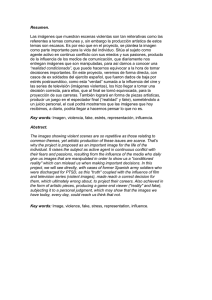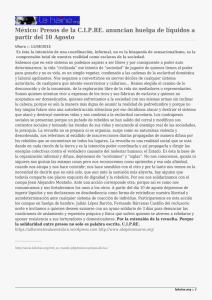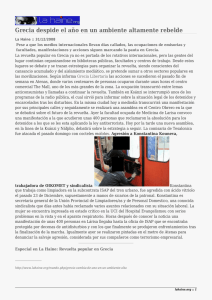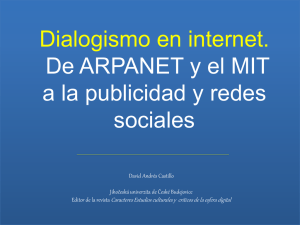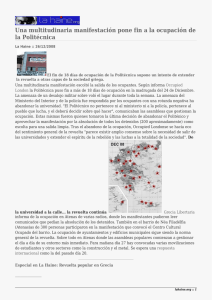Se busca negro para escribir TFM. De la revuelta íntima al fake.
Anuncio
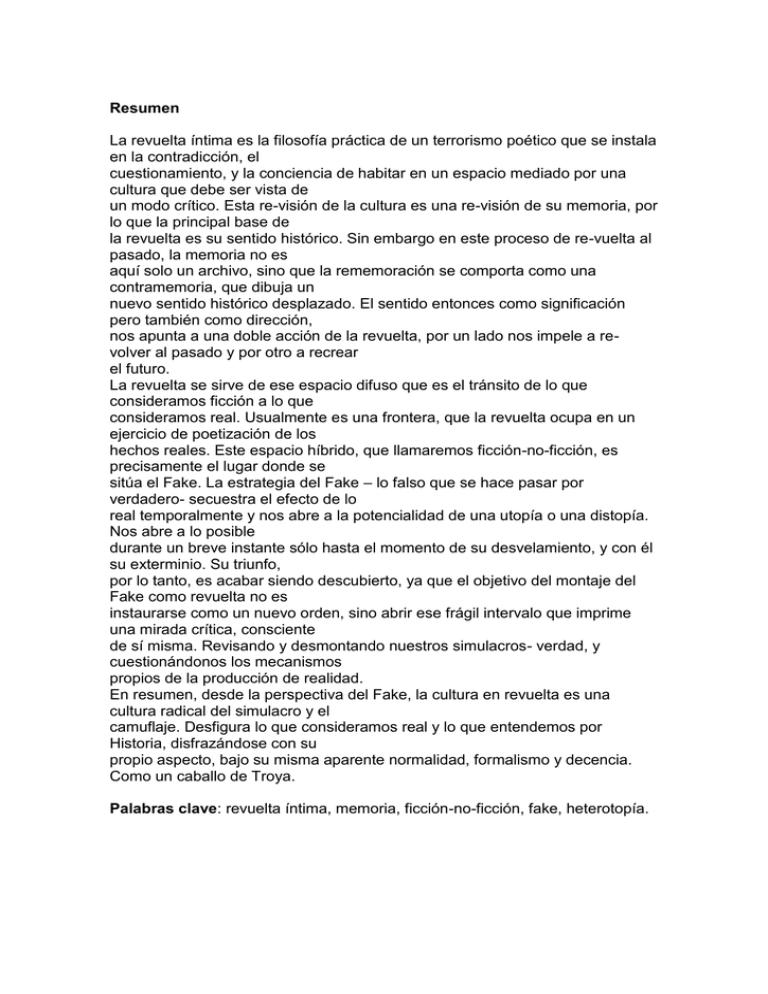
Resumen La revuelta íntima es la filosofía práctica de un terrorismo poético que se instala en la contradicción, el cuestionamiento, y la conciencia de habitar en un espacio mediado por una cultura que debe ser vista de un modo crítico. Esta re-visión de la cultura es una re-visión de su memoria, por lo que la principal base de la revuelta es su sentido histórico. Sin embargo en este proceso de re-vuelta al pasado, la memoria no es aquí solo un archivo, sino que la rememoración se comporta como una contramemoria, que dibuja un nuevo sentido histórico desplazado. El sentido entonces como significación pero también como dirección, nos apunta a una doble acción de la revuelta, por un lado nos impele a revolver al pasado y por otro a recrear el futuro. La revuelta se sirve de ese espacio difuso que es el tránsito de lo que consideramos ficción a lo que consideramos real. Usualmente es una frontera, que la revuelta ocupa en un ejercicio de poetización de los hechos reales. Este espacio híbrido, que llamaremos ficción-no-ficción, es precisamente el lugar donde se sitúa el Fake. La estrategia del Fake – lo falso que se hace pasar por verdadero- secuestra el efecto de lo real temporalmente y nos abre a la potencialidad de una utopía o una distopía. Nos abre a lo posible durante un breve instante sólo hasta el momento de su desvelamiento, y con él su exterminio. Su triunfo, por lo tanto, es acabar siendo descubierto, ya que el objetivo del montaje del Fake como revuelta no es instaurarse como un nuevo orden, sino abrir ese frágil intervalo que imprime una mirada crítica, consciente de sí misma. Revisando y desmontando nuestros simulacros- verdad, y cuestionándonos los mecanismos propios de la producción de realidad. En resumen, desde la perspectiva del Fake, la cultura en revuelta es una cultura radical del simulacro y el camuflaje. Desfigura lo que consideramos real y lo que entendemos por Historia, disfrazándose con su propio aspecto, bajo su misma aparente normalidad, formalismo y decencia. Como un caballo de Troya. Palabras clave: revuelta íntima, memoria, ficción-no-ficción, fake, heterotopía. Abstract The intimate riot, or intimate turn, is the performative philosophy of a poetic terrorism that settles in the contradiction, the questioning and the awareness of living in a culture mediated space that should be examined with attention. This cultural review is also a review of its memory, therefore the main basis of the riot lies on its historic sense. Nevertheless in this re-turning to the past process, the memory not only works as an archive, the remembrance behaves as anti-memory, that depicts a new displaced sense of history. The sense, as meaning, in spanish can also be a direction, that points us a double effect of the riot. On one hand it drives us to re-turn to the past and on the other to re-create the future. The riot uses the vague space in the transition from the fiction to what we consider real. Usually it is a boundary, that riot occupies in a poetization of the real facts. This hibrid space, that we will name after fiction-non-fiction, is excactly tge place where Fake is. La Fake strategy –the false that pretends to be truth-, kidnaps the real efect for a moment, and opens up a potencial utopia or dystopia. It brings “the possible” for a short moment till its disclosure, and then its extinction. The tryumph of the Fake is to be discovered, because the goal of the Fake as a riot is not to settle a new order, but open a fragile break that can print a critic perspective, aware of itself. Examining and dismantling our simulacrumtruths, and questioning the very “truth production” mecanisms. Summarizing, from the Fake-turn perspective, the riot culture is a radical simulacra and camouflage culture. Transforms what we consider real and what we understand as History, dressing up with the same apperance, apparent normality, formalism, and decency. As a Troyan horse. Key words. Intimate riot, intimate turn, memory, fiction-non-fiction, fake, heterotopy.
